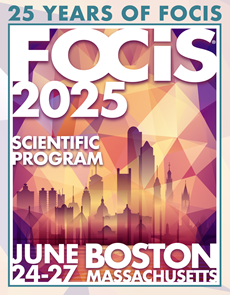Mucosal Immunology
Session: Microbiome and Immunity
Pooled Faecal Microbiotherapy Can Curb Refractory Gastrointestinal Acute Graft-versus-Host Disease Likely Through DP8a Treg Induction/Activation
Wednesday, June 25, 2025
1:25pm - 1:40pm East Coast USA Time
Location: Salons F-G
Margaux Verdon – INSERM U1302 - Immunology and New Concepts in Immunotherapy (INCIT); Bastien Laperrousaz – MaaT Pharma; Nathalie Corvaia – MaaT Pharma; Emilie Plantamura – MaaT Pharma; Aurore Duquenoy – MaaT Pharma; Patrice Chevallier – Clinical hematology department - Nantes University Hospital; Fabienne Haspot – INSERM U1064 - Center for Research in Transplantation and Translational Immunology (CR2TI); Véronique Daguin – INSERM U1064 - Center for Research in Transplantation and Translational Immunology (CR2TI); Francine Jotereau – INSERM U1302 - Immunology and New Concepts in Immunotherapy (INCIT); Frederic Altare – INSERM U1302 - Immunology and New Concepts in Immunotherapy (INCIT); Emmanuelle Godefroy – INSERM U1302 - Immunology and New Concepts in Immunotherapy (INCIT)
- Md
Margaux de Seilhac
PhD Student
INSERM U1302 - Immunology and New Concepts in Immunotherapy (INCIT)
Nantes, Pays de la Loire, France
Presenting Author(s)
Abstract Text: The conditioning regimen preceding allogeneic hematopoietic stem cell transplantation leads to a significant gut microbiota dysbiosis, characterized by a reduced diversity and an altered microbial composition. This dysbiosis promotes Graft-versus-Host Disease (GvHD) severity and mortality in both mice and humans. Therefore, restoring a healthy and diverse gut microbiota offers a promising strategy for GvHD treatment.
MaaT Pharma developed MaaT013, a microbiotherapy derived from pooled healthy human faecal microbiota, with high bacterial diversity. In a Phase III clinical trial, MaaT013 demonstrated a 62% gastrointestinal overall response rate and a 54% 1-year survival probability in refractory gastrointestinal acute GvHD (GI-aGvHD) patients.
To evaluate MaaT013’s impact on patients’ immune system, blood samples (14 patients) were collected from the ancillary ORION study to the expanded access program (NCT04768907) evaluating MaaT013 in refractory GI-aGvHD. We characterized DP8a Tregs, a Treg subset identified by our laboratory in the human colon and blood, TCR-specific for Faecalibacterium duncaniae, a Firmicutes member, highly represented in MaaT013. Remarkably, DP8a Tregs expanded only in MaaT013-responding patients, suggesting that MaaT013 could stimulate DP8a Tregs to curb GI-aGvHD.
Additional investigations revealed that DP8a Tregs can cross-react with Akkermansia muciniphila, another bacterium contained in MaaT013. These cross-reactions, and potentially others, could explain the DP8a Treg-mediated anti-inflammatory effect observed both in vitro and in vivo.
We further demonstrated that MaaT013 induces anti-inflammatory and Treg-polarizing molecules on dendritic cells, likely contributing to the induction/activation of DP8a Tregs.
Altogether, these data suggest the key role of DP8a Tregs to alleviate GI-aGvHD in response to MaaT013 faecal microbiotherapy.
MaaT Pharma developed MaaT013, a microbiotherapy derived from pooled healthy human faecal microbiota, with high bacterial diversity. In a Phase III clinical trial, MaaT013 demonstrated a 62% gastrointestinal overall response rate and a 54% 1-year survival probability in refractory gastrointestinal acute GvHD (GI-aGvHD) patients.
To evaluate MaaT013’s impact on patients’ immune system, blood samples (14 patients) were collected from the ancillary ORION study to the expanded access program (NCT04768907) evaluating MaaT013 in refractory GI-aGvHD. We characterized DP8a Tregs, a Treg subset identified by our laboratory in the human colon and blood, TCR-specific for Faecalibacterium duncaniae, a Firmicutes member, highly represented in MaaT013. Remarkably, DP8a Tregs expanded only in MaaT013-responding patients, suggesting that MaaT013 could stimulate DP8a Tregs to curb GI-aGvHD.
Additional investigations revealed that DP8a Tregs can cross-react with Akkermansia muciniphila, another bacterium contained in MaaT013. These cross-reactions, and potentially others, could explain the DP8a Treg-mediated anti-inflammatory effect observed both in vitro and in vivo.
We further demonstrated that MaaT013 induces anti-inflammatory and Treg-polarizing molecules on dendritic cells, likely contributing to the induction/activation of DP8a Tregs.
Altogether, these data suggest the key role of DP8a Tregs to alleviate GI-aGvHD in response to MaaT013 faecal microbiotherapy.

